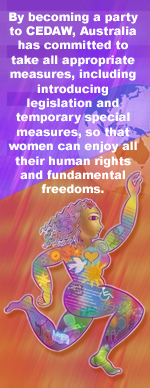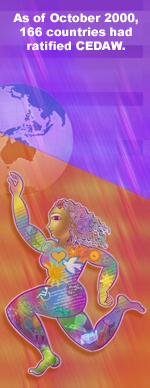Woman of the World - What is CEDAW?
Woman of the World -
Know Your International Human Rights
- Preface
- What are human rights?
- What is the United Nations?
- The UN: Protecting the rights of woman
- What is CEDAW
- Australia's signing of CEDAW
- A guide to the rights in CEDAW
- CEDAW and the Sex Discrimination Act
- The Optional Protocol to CEDAW
- What about Beijing?
- What can you do: The public sphere
- What can you do: Private actions
"Ultimately we have to be judged not by our highest ambitions and achievements, but by our ability to raise from the lowest level those whose needs that are greatest. That is the way I would like Australia, and every other country, to be judged in the United Nations."
Australia's Justice Elizabeth Evatt (Member of the CEDAW Committee 1984-1992, Chair of the CEDAW Committee 1989 - 1990) highlighting the importance of CEDAW to developed countries.
 The Convention on the Elimination of All Forms of Discrimination Against Women (CEDAW) was adopted in 1979 by the UN General Assembly and entered into force on September 2, 1981.
The Convention on the Elimination of All Forms of Discrimination Against Women (CEDAW) was adopted in 1979 by the UN General Assembly and entered into force on September 2, 1981.
CEDAW has often been described as an 'international bill of rights' for women. Enshrined within its preamble and 30 Articles are key principles of equality and an agenda for national action to end discrimination against women. It is based on the belief that basic human rights include the true equality of men and women.
What rights are in CEDAW?
The rights enshrined in CEDAW broadly cover all aspects of women's lives. Rights include political participation, health, education, employment, marriage, family relations and equality before the law. By becoming a party to CEDAW, Australia has committed to take all appropriate measures, including introducing legislation and temporary special measures, so that women can enjoy all their human rights and fundamental freedoms.
CEDAW defines discrimination against women as
"...any distinction, exclusion or restriction made on the basis of sex which has the effect or purpose of impairing or nullifying the recognition, enjoyment or exercise by women, irrespective of their marital status, on a basis of equality of men and women, of human rights and fundamental freedoms in the political, economic, social, cultural, civil or any other field." (Article 1)
 The CEDAW Committee:
The CEDAW Committee:
National governments that have committed to CEDAW submit reports to the CEDAW Committee at least every four years. These reports detail the measures the national government has taken to comply with its obligations. The CEDAW Committee is made up of 23 members elected in their capacity as 'gender experts'. The CEDAW Committee meets twice yearly to address specific topics in CEDAW and monitor individual countries' progress.
NGOs and CEDAW:
NGOs play an active role in the monitoring and implementing of CEDAW by:
- spreading awareness of CEDAW and the rights in it to men and women around the world;
- lobbying governments, businesses and individuals to implement CEDAW;
- compiling 'shadow reports' to the four-yearly national government reports sent to the CEDAW Committee and assisting the Committee with information; and
- providing information to national governments on progress, difficulties and strategies to enable more effective human rights implementation.
As of October 2000, 166 countries had ratified CEDAW.

